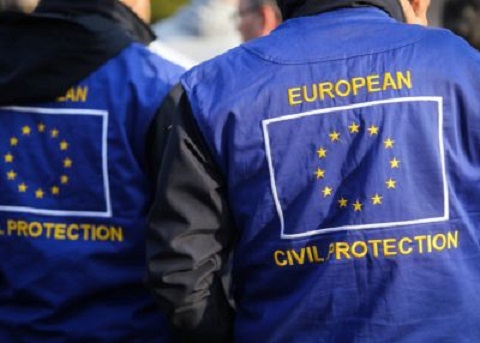What are the changes to the EU Civil Protection Mechanism that the European Parliament has approved?
The targeted amendments strengthen the EU Civil Protection Mechanism, in particular in response to large-scale emergencies, affecting several countries at the same time, where national responses and voluntary assistance are not sufficient. The Mechanism will be better prepared, more flexible, respond faster and offer better cross-sectoral support to Member States and their citizens, including through a significantly enhanced budget.
What are the concrete improvements and what role does rescEU play?
In 2019, the rescEU reserve was created as a new European reserve of resources which to date includes a fleet of firefighting aircraft, medical evacuation aircraft and a strategic stockpile of medical equipment to respond to emergencies. So far, the EU has fully financed its Member States to establish and maintain the rescEU reserves. With the April 2021 upgrade, the European Union response to large-scale crises was enhanced by enabling the Commission to, if needed, directly buy or lease emergency rescEU capacities in cases where national capacities are overwhelmed. The procurement of medical equipment and therapeutics at EU-level is only one example. This new approach can save time and resources. Through rescEU, the European Commission will also be able to lease suitable modes of transport and logistic solutions, for example, to bring European citizens to safety if stranded outside the Union, or to transfer medical personnel, medical equipment and therapeutics.
Read also
What other changes and improvements are foreseen?
A fast European coordination of Member States’ responding to a disaster can be lifesaving. The new legislation foresees a strengthening of the EU’s Emergency Response Coordination Centre – the EU’s hub for crisis management – with enhanced operational, analytical, monitoring, information management and communication capabilities.
Does the legislation foresee means to strengthen European Union disaster prevention and preparedness activities?
Disaster prevention and preparedness activities are core to the EU’s crisis management approach. The new legislation asks for the definition of Union-wide disaster resilience goals and scenario plans together with Member States and improved disaster loss data collection to support evidence-based scenario building. This reference underlines the EU’s continuous dedication to support its Member States in preventing and preparing for disasters.
How does the new legislation limit the environmental impact from disasters?
Under the strengthened Mechanism, the EU will equally provide financial support for the transport of assistance in environmental disasters in cases where the ‘polluter pays principle’ applies. For example during an oil spill, the Union Civil Protection Mechanism can be activated to protect marine life.
What is the financial contribution the EU will make to its crisis management under the Multiannual Financial Framework 2021-2027?
Adequate financial support and flexibility are necessary to face the realities of a large-scale emergency. We count on a significantly enhanced budget with EUR 1,26 billion foreseen under the 2021-2027 Multiannual Financial Framework and additional EUR 2,05 billion through the Next Generation EU Recovery Instrument. In addition, the European Commission will have greater possibilities to manage and implement the budget via new options of multi-annularity, indirect management, joint procurement of rescEU capacities and carry-over of budget reserves for response actions to the following year.
When will the new legislation enter into force and when can we expect that the EU’s crisis management has indeed become more robust?
The legislative proposal was put forward by the Commission in June 2020 and found political agreement of the co-legislators in February 2021. It will be formally adopted by the Parliament at the end of April and by the Council beginning of May. It is expected to enter into force in mid-May this year. The Union Civil Protection Mechanism, including its additional rescEU reserve, is operational as we speak and will be gradually strengthened over the upcoming months. The next steps will be defining further capacities in the rescEU reserve and work with Member States will immediately start on setting-up disaster resilience goals.
Why was the legislative framework for the Union Civil Protection Mechanism revised now?
A changing risk landscape in Europe and in the world calls for a strengthened emergency management system. The lessons learnt resulting from the current pandemic emphasise, for example, the need to better anticipate and prepare for the impacts of future emergencies that can quickly evolve into complex large-scale societal crises with multiple cascading effects in different areas. With climate change-induced disaster risks on the rise and evolving security threats, the EU is increasingly exposed to the threat of large-scale crises. In parallel, growing urbanisation, digitalisation and cross-sectoral interdependence exacerbate existing and create new vulnerabilities. Against this backdrop, the European Council and the European Parliament called in 2020 to put in place a more ambitious and wide-ranging crisis management system within the EU. The targeted revision of the Union Civil Protection Mechanism will allow the Mechanism to take a key role within the enhanced EU crisis management system.
How does the new EU Civil Protection Mechanism align with views of EU citizens?
The EU’s civil protection policy enjoys strong public support as one of the very practical facets of the EU solidarity, extended to people affected by disasters – in Europe and globally. In parallel to the legislative process, the Commission conducted a Eurobarometer survey to gauge public opinion on European civil protection throughout the 27 Member States. The findings show strong support for EU’s crisis management, with 84 % of Europeans agreeing that coordinated EU action should be increased to respond more effectively to future disasters and crises. More than 9 in 10 Europeans agree that their country should provide help when a disaster strikes in another EU country that is too big to deal with on their own, a clear sign of support for EU solidarity. The new legislation thereby does not only respond to the call from EU Member States and the EU Parliament, but is also aligned with public opinion on the EU’s crisis management role.
European Union

























































